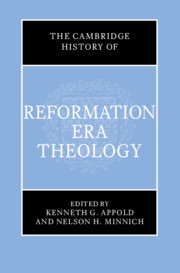Book contents
- The Cambridge History of Reformation-Era Theology
- The Cambridge History of Reformation-Era Theology
- Copyright page
- Contents
- Figures
- Acknowledgments
- Contributors
- Abbreviations
- Introduction
- Part One Theology in an Age of Cultural Transformation
- Part Two Schools and Emerging Cultures of Theology: Diversity and Conformity within Confessions
- Part Three Topics and Disciplines of Theology
- Index
Introduction
Published online by Cambridge University Press: 27 September 2023
- The Cambridge History of Reformation-Era Theology
- The Cambridge History of Reformation-Era Theology
- Copyright page
- Contents
- Figures
- Acknowledgments
- Contributors
- Abbreviations
- Introduction
- Part One Theology in an Age of Cultural Transformation
- Part Two Schools and Emerging Cultures of Theology: Diversity and Conformity within Confessions
- Part Three Topics and Disciplines of Theology
- Index
Summary
Most histories of Reformation-era theology have been organized either by theologian or by subject. Both approaches follow a straightforward logic, but they also have limitations, and these have become more evident as the field has expanded and become more complex. Works that treat theology as products of individual minds tend to overlook the role of dialogue and collaboration, mutual influences, and academic exchange in the generation of ideas. That is especially problematic for an era that was shaped by the emergence of new religious communities and confessional identities, powerful currents of polemic and controversy, and strategies for conflict resolution – none of which are given adequate account by viewing individual theologians in isolation. Organizing a history of theology by subject, that is, according to a list of prominent theological topics, solves some of the problems of the first approach but introduces a different set of deficits.
- Type
- Chapter
- Information
- Publisher: Cambridge University PressPrint publication year: 2023

